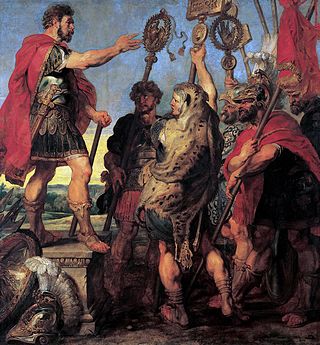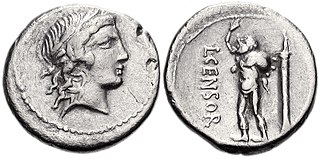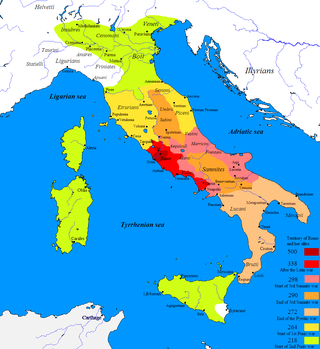Related Research Articles

The cursus honorum was the sequential order of public offices held by aspiring politicians in the Roman Republic and the early Roman Empire. It was designed for men of senatorial rank. The cursus honorum comprised a mixture of military and political administration posts; the ultimate prize for winning election to each "rung" in the sequence was to become one of the two consuls in a given year.

The Conflict of the Orders, also Struggle of the Orders, was a political struggle between the plebeians (commoners) and patricians (aristocrats) of the ancient Roman Republic lasting from 500 BC to 287 BC in which the plebeians sought political equality with the patricians. It played a major role in the development of the Constitution of the Roman Republic. Shortly after the founding of the Republic, this conflict led to a secession from Rome by the Plebeians to the Sacred Mount at a time of war. The result of this first secession was the creation of the office of plebeian tribune, and with it the first acquisition of real power by the plebeians.

Lucius Papirius Cursor was a celebrated politician and general of the early Roman Republic, who was five times consul, three times magister equitum, and twice dictator. He was the most important Roman commander during the Second Samnite War, during which he received three triumphs.

Lucius Minucius Esquilinus Augurinus was a Roman politician in the 5th century BC, consul in 458 BC, and decemvir in 450 BC.

The gens Marcia, occasionally written Martia, was one of the oldest and noblest houses at ancient Rome. They claimed descent from the second and fourth Roman Kings, and the first of the Marcii appearing in the history of the Republic would seem to have been patrician; but all of the families of the Marcii known in the later Republic were plebeian. The first to obtain the consulship was Gaius Marcius Rutilus in 357 BC, only a few years after the passage of the lex Licinia Sextia opened this office to the plebeians.

Publius Decius Mus, of the plebeian gens Decia, was a Roman consul in the years 312 BC, 308 BC, 297 BC and 295 BC. He was a member of a family that was renowned for sacrificing themselves on the battlefield for Rome.

The Roman magistrates were elected officials in ancient Rome. During the period of the Roman Kingdom, the King of Rome was the principal executive magistrate. His power, in practice, was absolute. He was the chief priest, lawgiver, judge, and the sole commander of the army. When the king died, his power reverted to the Roman Senate, which then chose an Interrex to facilitate the election of a new king.

The executive magistrates of the Roman Republic were officials of the ancient Roman Republic, elected by the People of Rome. Ordinary magistrates (magistratus) were divided into several ranks according to their role and the power they wielded: censors, consuls, praetors, curule aediles, and finally quaestor. Any magistrate could obstruct (veto) an action that was being taken by a magistrate with an equal or lower degree of magisterial powers. By definition, plebeian tribunes and plebeian aediles were technically not magistrates as they were elected only by the plebeians, but no ordinary magistrate could veto any of their actions. Dictator was an extraordinary magistrate normally elected in times of emergency for a short period. During this period, the dictator's power over the Roman government was absolute, as they were not checked by any institution or magistrate.

Marcius Censorinus was a name used by a branch of the plebeian gens Marcia of ancient Rome. The cognomen Censorinus was acquired through Gaius Marcius Rutilus, the first plebeian censor, whose son used it. The gens Marcia claimed descent from both Ancus Marcius, a king of Rome, and symbolically from Marsyas the satyr, who was associated with free speech and political liberty; see further discussion at Prophecy and free speech at Rome. The Marcii Censorini were consistent populares, supporting Marius, Cinna, Julius Caesar, and Antonius.
Lucius Marcius Censorinus was a Roman politician and military leader of the Middle Republic, serving as consul with Manius Manilius in 149 BC and censor in 147 BC. He led the fleet during the first phase of the Third Punic War.
The Roman–Volscian wars were a series of wars fought between the Roman Republic and the Volsci, an ancient Italic people. Volscian migration into southern Latium led to conflict with that region's old inhabitants, the Latins under leadership of Rome, the region's dominant city-state. By the late 5th century BC, the Volsci were increasingly on the defensive and by the end of the Samnite Wars had been incorporated into the Roman Republic. The ancient historians devoted considerable space to Volscian wars in their accounts of the early Roman Republic, but the historical accuracy of much of this material has been questioned by modern historians.
Gaius Marcius Censorinus was a late Roman Republican politician and soldier who participated in the first civil war of the Roman Republic, against Sulla.
Gaius Sulpicius Peticus was a prominent 4th-century BC Roman politician and general who served as consul five times and as dictator once. Sulpicius was a member of the gens Sulpicia, a prominent patrician family which had attained the consular dignity a great number of times following the foundation of the republic. However, the familial relationship between Sulpicius and other known contemporary members of the gens is unknown, with the only information about his heritage being that his father was named Marcus and his grandfather was named Quintus.
Gaius Plautius Proculus was the first member of the gens Plautia to achieve consular rank.
Gaius Julius Iullus was a Roman statesman and member of the ancient patrician gens Julia. He was consular tribune in 408 and 405 BC, and censor in 393.
Gaius Julius Iulus was a member of the Roman gens Julia, and was nominated dictator in 352 BC.

Quintus Publilius Philo was a Roman politician who lived during the 4th century BC. His birth date is not provided by extant sources, however, a reasonable estimate is about 365 BC, since he first became consul in 339 BC at a time when consuls could be elected in their twenties. His Greek cognomen ‘Philo’ was unique to his family.
Publius Valerius Poplicola was a Roman politician and general in the mid 4th century BC who served as Roman Consul, Praetor, Dictator, and Magister Equitum during his career.
Publius Cornelius Arvina was a Roman politician and general who lived in the late 4th century and early 3rd century BC, who served as consul of the Roman Republic twice, and as censor once.
References
- 1 2 Antony Kamm, The Romans, An Introduction, p. 13.
- ↑ T.P. Wiseman says that it was not his son, but Marcius Rutilus himself who was consul in 310; see "Satyrs in Rome?" Journal of Roman Studies 78 (1988), p. 4.
- ↑ Fergus Millar, The Roman Republic and Augustan Revolution